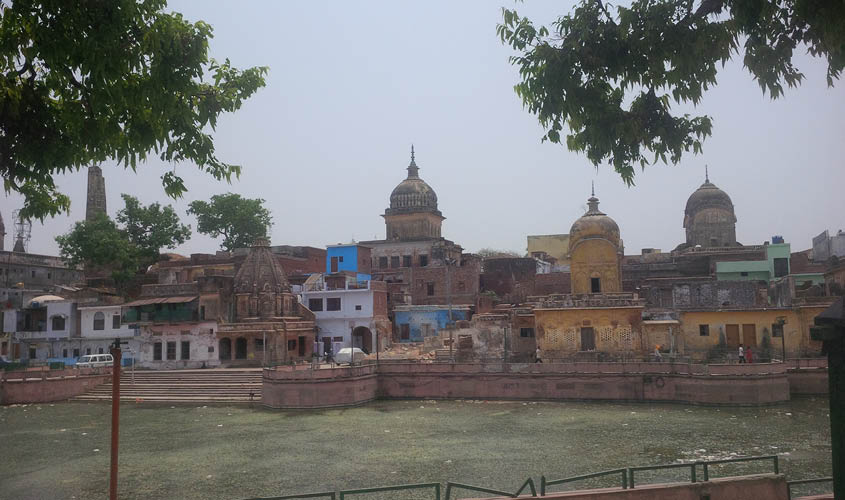New Delhi: The failure of the mediation panel constituted by the Supreme Court to resolve the Ayodhya Ram Janmabhumi title case was “not unexpected” as similar efforts made in the past did not bear any fruit. Now the Supreme Court will commence hearing appeals on a daily basis from 6 August.
Source said that several efforts were made in the past to resolve the issue through an out-of-court settlement or mediation, but not one was successful. In fact, multiple attempts were made by the then Prime Ministers, including Rajiv Gandhi, V.P. Singh and Chandrasekhar, but all in vain.
In 1989, soon after becoming Prime Minister, V.P. Singh formed a three-member committee but the representatives of the Babri Masjid Action Committee (BMAC) refused to participate in the proceedings. The next year, when Chandrasekhar became PM, he tried revive the process of negotiations once again by setting up a committee of 10 members each from BMAC and the Vishwa Hindu Parishad (VHP), with the then Home Minister Subodh Kant Sahai as its convenor.
In fact, the VHP and BMAC were asked to form four sub-committees on archaeology, history, law and revenue and religious records with experts of their choice. The panel met four times, but could not reach a consensus and the entire exercise failed.
The then Prime Minister Rajiv Gandhi also tried an out-of-court settlement but did not succeed. Other PMs—P.V. Narasimha Rao and Atal Bihari Vajpayee—tried to arrange a face-to-face meeting between the Sangh Parivar and some Muslim parties through back channels, but this exercise also did not yield any results. Vajpayee set up an Ayodhya cell in his office
In 2002 and again in 2003, the Kanchi Shankaracharya Jayendra Saraswati tried to solve the issue through negotiations. But the Hindus and the Muslims could not reach a consensus. There was also effort from Dalai Lama, but he also failed.
In 2015, Mohammad Hashim Ansari, the oldest litigant from the Muslim side, met Akhara Parishad president Mahant Gyan Das with a new formula, which they planned to place before the Supreme Court. But that effort too failed. Another attempt was made when Swami Chakrapani, president of the All India Hindu Mahasabh met Muslim litigants. But again it did not bear any fruit.
In 2016, Mahant Narendra Giri, the newly elected president of the All India Akhara Parishad met Hashim Ansari. But later Ansari died and the talks collapsed.
In 2017, the then Chief Justice of the Supreme Court, J.S. Kehar had suggested a negotiated settlement and had offered himself as a mediator. However, the proposal did not find any favour with the All India Muslim Personal Law Board (AIMPLB) and the BMAC.
The same year, Sri Sri Ravi Shankar of the Art of Living, who was also a member of the recent SC-appointed mediation panel, gave four options to resolve the dispute. But his ideas were rejected by Hindu groups, including the Ram Janmabhoomi Nyas, and the AIMPLB.
Recently, the Supreme Court gave the panel, which was set up earlier this year, time till Thursday to submit its report. The panel consisted of former Supreme Court judge F.M. Kalifulla, Sri Sri Ravi Shankar and senior advocate Sriram Panchu. It started consultations in March to explore an amicable settlement. A decision on the case has to come before 17 November when the Chief Justice retires.
The Constitution Bench opted for mediation despite objections from petitioners like the Uttar Pradesh government. Barring the Sunni Waqf Board and the Nirmohi Akhara, one of the Hindu petitioners, all were against mediation. But the judges had said mediation may help in “healing relations”. Gopal Singh Visharad, legal heir to one of the original litigants, had said that the mediation process should be discontinued on the ground that there was no headway.
According to VHP spokesperson Vinod Bansal, a mediation effort is not new. “But everybody knows the outcome. On some days the other party did not provide required documents and they could not counter the documents submitted by us. Also, on some occasions they did not turn up for the meetings. We never favoured the idea of mediation. Talks should be held for what, when all the facts related to the issue on record and clear?”
VHP’s working president Alok Kumar said: “We are satisfied with the SC’s decision to go for regular hearing. We hope that the 500-year-old struggle of the Hindu community and 70 years of legal battle will be resolved and we will get justice soon.”

